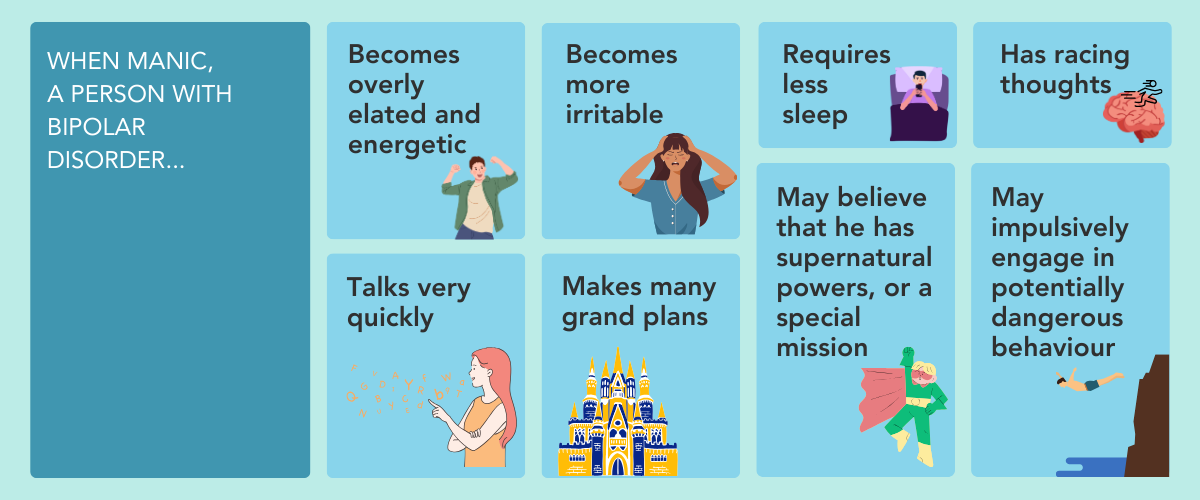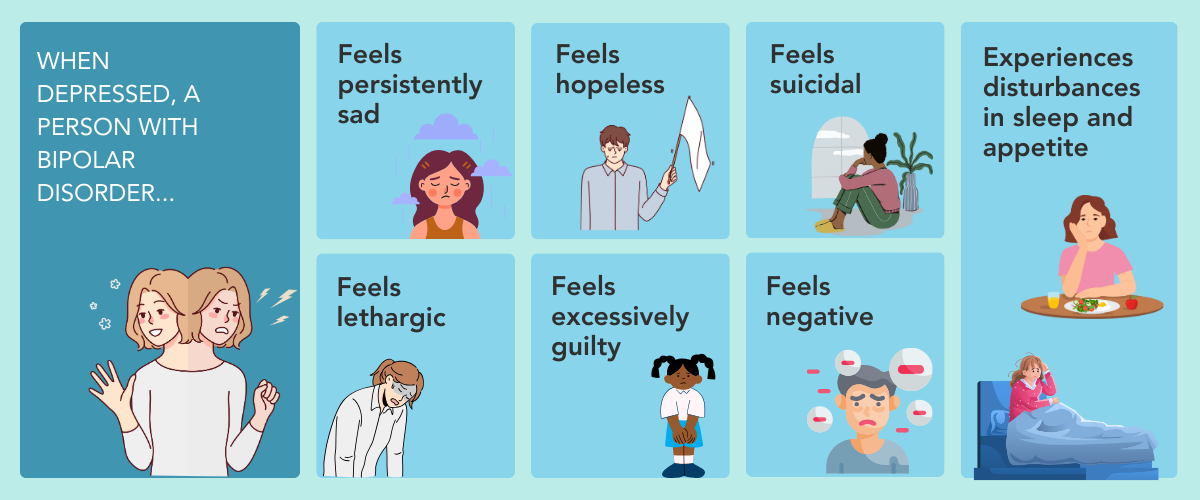The symptoms of bipolar disorder usually surface during early childhood, typically between the ages of 15 and 24. It can be hard to recognise them in teenagers because extreme behaviour or emotions are sometimes viewed as part and partcel of adolescent life.
Symptoms can also appear during other stages of life.
Find out more about depressive episodes and manic/hypomaic episodes below:
Manic or hypomanic episodes

Symptoms of mania in bipolar disorder include: Becoming overly elated and energentic; irritable; quick speech; making grand plans; racing thoughts; sleeplessness; belief in supernatural powers or purpose and impulsivity
During episodes of mania, the patient's mood is elevated along with increased energy and activity levels. They may lose their social inhibitions and display a shortened attention span and inflated self-esteem. Manic symptoms can vary from feeling very happy and carefree to being extremely excited and unable to control oneself. This can include talking a lot, getting easily distracted, making rash decisions, or having big and unrealistic ideas.
Mania can also manifest as heightened irritability, racing thoughts or aggressive behaviour. Some patients may also experience delusions or hallucinations together with their mood symptoms.
Hypomania includes less severe manic symptoms described above and does not come with delusions or hallucinations. During these periods, the person may become very productive and creative, seeing these experiences as valuable and positive. However, hypomania can become more severe if left untreated.
Depressive episodes

Symptoms of depression in biopolar disorder include: Persistent sadness; hopelessness; guilt; lethargy and suicidality. Some may also feel disturbances in sleep and appetite.
Depressive symptoms for bipolar disorder include lower energy and activity levels. They may feel tired and morose, and experience a loss of interest in things they used to enjoy. The person may feel guilty and worthless, and experience disturbed sleep, difficulty concentrating and a lack of appetite. In some cases of severe episodes of depression, they may have ideas of self-harm or suicide.
Mixed episodes
Sometimes, patients may experience symptoms of both mania and depression during the same episode. These symptoms may alternate rapidly from day-to-day or even hour-to-hour.
There are many chemicals in the brain (called neurotransmitters) that control mood, perception and judgement. It is believed that imbalances in certain neurotransmitters cause bipolar disorder. They may be imbalanced due to genetic reasons. People with relatives who have mood disorders may be at greater risk of developing bipolar disorder.
In addition to genetic influences, stressful life events and certain personality traits might predispose someone towards developing bipolar disorder.
Alcohol and illegal drug-use also have a profound impact on mood state. Using these substances can increase the risk of a relapse and interfere with medications used to treat bipolar disorder.
Understanding Bipolar Disorder with Mahita Vas
Bipolar disorder is a chronic illness, like diabetes. It is treated mainly with medication to manage acute episodes and help prevent relapse. Mood stabilisers, antidepressants, anti-psychotics and sedatives can be used in different combinations, depending on the patient's condition. It may take a few days to a few weeks for a person to experience the optimal effect of medications.
Therapies like cognitive behavioural therapy can help patients recognise early signs of an episode. They can also help patients seek treatment, improve relationships and make lifestyle changes to prevent triggers.
Support and understanding from family members and friends are equally important in the treatment of bipolar disorder. Caregivers are encouraged to learn about the condition so that they can provide emotional and practical suport. This may involve helping patients with daily tasks when they are experiencing a manic or depressive episode. It also includes encouraging them to take their medicatoin and go to therapy sessions.
Appropriate treatment, follow-up and support can help control bipolar disorder effectively. In severe cases, patients may benefit from electroconvulsive therapy (ECT).
Can mania sometimes be fun and productive?
Whilst everyone wants to feel happy, manic episodes can often result in severe consequences. For example, patients whilst manic may take dangerous risks because they believe they won't get hurt. They may also spend all their savings excessively.
Isn't bipolar disorder just a case of bad mood swings?
The symptoms of bipolar disorder are more severe than the normal ups and downs that most people experience. When left untreated, they can cause significant disruption in the lives of the patient and the people around them. It is a chronic mental illness that requires lifelong management, typically through a combination of medication, psychotherapy and lifestyle changes.